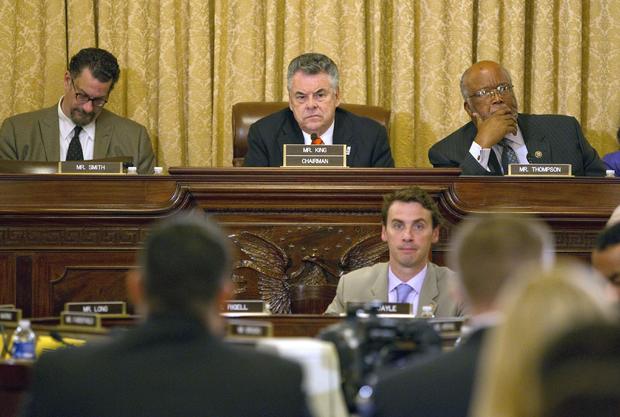Terror recruitment hearing focuses on Somali Americans
The third House hearing on home-grown radicalism in the United States provoked controversy Wednesday for its focus on Somali-American Muslims, particularly in the wake of the Norway massacre carried out by a right-wing Christian terrorist.
Rep. Peter King, R-N.Y., chairman of the House Homeland Security Committee, vowed to continue the hearing despite protests from the "political correct community" because the Somali terrorist network al-Shabaab has successfully recruited Muslim Americans, he said, and may turn its attention to American targets, both foreign and domestic. Using harsh words, King castigated his critics for their objections.
"Certain elements of the politically correct media, most egregiously the vacuous ideologues at the New York Times, are shamelessly attempting to exploit the horrific tragedy in Norway to cause me to refocus these hearings away from Muslim-American radicalization," King said. "If they had even a semblance of intellectually honesty, the Times and others would know and admit that there is no equivalency in the threat to our homeland from a deranged gunman and the international terror community apparatus of al Qaeda and its affiliates who are recruiting people in this country and have murdered thousands of Americans."
Rep. Yvette Clarke, D-N.Y., argued that radicalism is "cross cultural, cross religious, cross ethnicity" and that focusing only on Muslim radicals would leave America vulnerable to the unexpected. She argued that holding hearings on Muslims would risk ostracizing communities, leaving them more vulnerable to extremist influence.
Rep. Michael McCaul, R-Texas, dismissed the criticism because, he said, they are investigating radicals, not Muslims. He insisted, "I am mystified by the controversy that has been caused by this."
The president of the Canadian Somali Congress, Ahmed Hussen, applauded the hearings for their focus on Muslims. He said that they are important to him and other Somali Americans, because they help to empower the community and remove the stigma surrounding them.
The hearing focused on the recruitment efforts of al-Shabaab, a Somali terrorist group with links to al Qaeda. The group has successfully recruited dozens of Americans and Canadians to travel abroad to help fight in Somalia. So far, the group has not attacked American targets, but their effort to recruit Americans shows that they have international aspirations, according to William Folk, former Assistant United States Attorney.
"Al-Shabaab has worked tirelessly to rise from the chaos of Somalia to become a terrorist network with international influence," Folk said.
Folk fears that the terrorist organization may be able to recruit Americans, who would then travel to a Somali terrorist camp and learn bomb making skills. They could then return to the United States to carry out an attack or recruit others, while staying under intelligence agencies' radar.
Hussen said Muslims in the U.S. and Canada become vulnerable to radical influence when they believe they have been rejected by society and can never become fully integrated. He pointed to law-abiding young people who graduate from college and are unable to find a job because of their ethnicity.
"They become easily vulnerable to people who feed them anti-Western narratives," Hussen said. "With opportunity, there is less [of a] door for radicals to come in."
U.S. and Canadian governments should promote a counter-narrative that emphasizes integration and respect for human rights, Hussen said. He noted that many Muslims have more freedom to practice their religion here than in Muslim countries, where different branches of Islam are sometimes repressed. Muslim values do not conflict with Western values, he asserted.
"We must also ensure that the Somali community understands that the United States' interest in that community is not putting names on indictments," Folk said.
In the Twin Cities area of Minnesota, where most of the recruits have come from, the police department has focused on building trust between them and the Somali community, especially its younger members, according to Thomas Smith, the Chief of Police for Saint Paul. This has involved camping trips, math tutoring and a football league, all led by police officers, which has increased dialogue between police and the community.
"We find new examples every day where Somali-American youth confide in police officers," Smith said.
